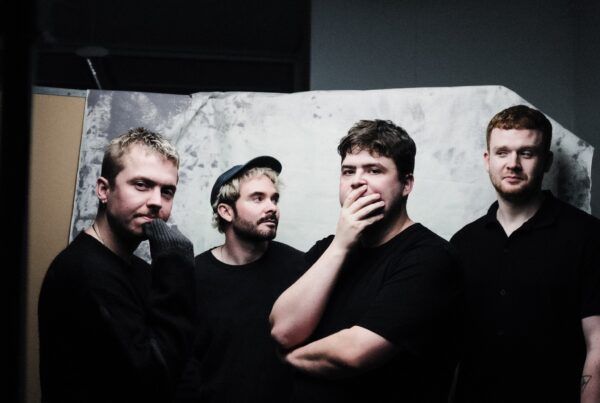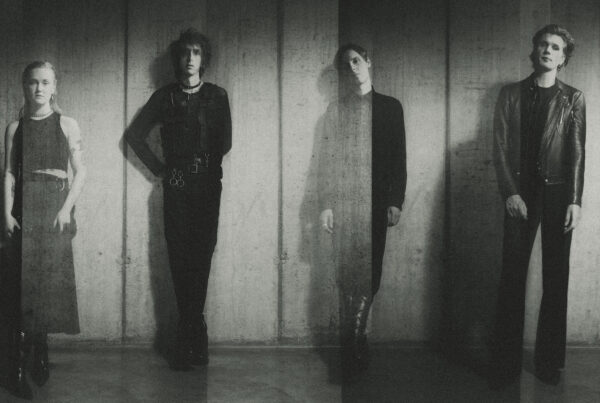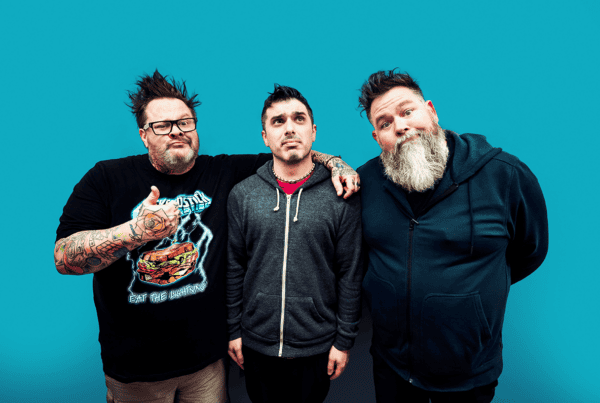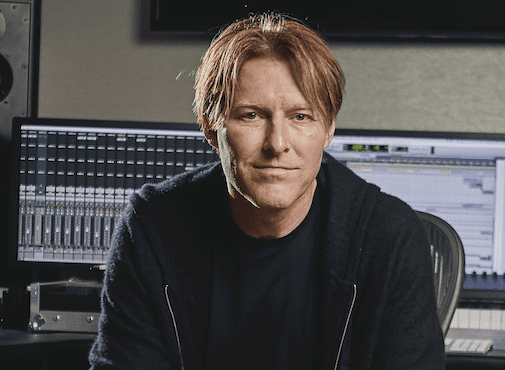Rock Sound is one of the UK’s leading alternative music publications catering for a variety of genres including rock, metal, electronica and indie music. Darren Taylor joined the publication in 1999 as deputy editor and co-founded the UK-version of the magazine with publisher Patrick Napier and within a year became the editor. Over the last decade, the magazine has gone from strength-to-strength thanks to a core team of creative individuals with a passion for all things that rock. Recently, for the first of many “industry-related” articles to come on SPHERE, we had the chance to speak with Darren and get his thoughts on the music industry, journalism and getting noticed…
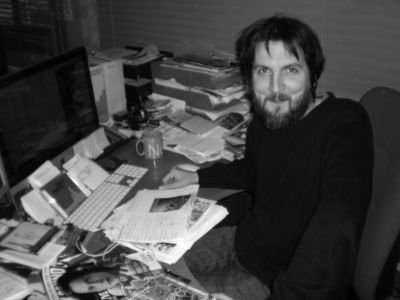
“The music industry is a beast“
S] Darren, can you tell us a little bit about how you got started in the industry and what the process was like for you starting out?
DT] I can’t remember the exact year but when I started out in the music industry I lived up in Stoke-On-Trent and I applied for a job with a company who had a division that put together compilation CDs and so that was my first job in music. I applied for that, got the job and worked there for about a year before they closed down the department. Fortunately, they had a position open in London so I took it because I wanted to get out of Stoke, they gave me a week and I just moved. I then started working for this company in London. I went on to work for a number of different record companies and I think my last job before this was working with Cooking Vinyl. Then, through a contact at the Italian Rock Sound [the publication was originally French-owned and they had publications in Italy, Spain and France] my name was put forward to help launch the magazine in the UK. I met up with the publisher Patrick [Napier] and we spoke with the French guys who talked to us about what they wanted to do and achieve. It really was like being thrown in at the deep end because I’d never worked on a magazine before. I got a guy called William Luff involved, he became the editor and to start with I was the ‘second in command’ and it was literally a case of us saying, ‘Right, we’ve got to do this magazine‘ and, we did.
S] What would be your advice to another journalist, or someone who wants to get into the industry on the best ways to go about getting involved in music?
DT] I think that studying a journalism degree certainly helps and gives you a good grounding. I never actually did that and I do know several other people who didn’t go down that route and I think at the end of the day, if you are a good writer that will come across to the editor or whoever it is that you are sending your work to. It’s also about having interesting and unique questions when you are speaking with bands to get the best out of them and not asking the same standard questions about their new album that 20 other people will ask – it’s about putting a bit of thought and research into it and coming out with a really good piece of copy about the artist because some of them can be a bit dull. You need to make sure that you can get the best interview out of them.
S] Flipping the coin a little now, what about for bands – what’s the best way for them to get exposure in your experience?
DT] With Rock Sound, we get sent so much material by bands every month – from those that are signed to major labels, bands that are signed to independent labels and bands that just submit it themselves – we always try to listen to as much as we possibly can. When we come across something that we like, we will feature the band. We’ve always championed ‘the underground’ and independent sounds so if we do find a band, and they’re unsigned, I love the fact that we can give them some exposure, whether that be an interview in the magazine, a demo review or even putting them on the Rock Sound CD.
S] Rock’s musical landscape is always changing and so you’re never short of bands to cover. So, what’s the biggest challenge that faces you as the editor of Rock Sound now?
DT] I think the biggest challenge right now with the emergence of the internet, is trying to expand the brand into different media. It is a magazine first, but really now we focus on Rock Sound as a brand and we reach people through various different channels, so whether that’s through the website, the magazine or through our Facebook and Facebook, there’s various different ways that people can consume the brand and find out about new music. I think that is the biggest challenge really for everybody in publishing – how do you maintain the brand? What works best online, what is best for the magazine and how do you break it up?
S] You’ve managed to create some Rock Sound sponsored tours and make the crossover into live events – how much do you enjoy that side of things?
DT] We’ve sponsored a lot of tours and there’s no financial gain in doing that for us. From my point of view, with the tours that we put our name to – these are just bands that we are trying to help out and bands that I think deserve to be heard. As a music fan myself, I just want people to go and see these acts. There’s nothing worse than when you promote a tour and ten people show up because you want 5,000 people there to see the bands because they are incredible. But, these things take time and on a band’s second or third tour more people will start showing up but if we keep hammering on about them, eventually someone might listen. There are lots of bands that we’ve championed in the past that nobody else has like Aereogramme and Isis, but we’ve stuck to our guns and we will continue to.
Eventually, I’d like to be involved in bigger tours and maybe even do a Rock Sound arena tour and maybe in the future that’s something we can achieve. We’ve certainly done some bigger tours in the past with bands like The Bronx, Fu**ed Up and Rolo Tomassi but of course, I want to make it bigger and I am always working towards that by expanding the name of the magazine – I still think there are a lot of people who don’t know Rock Sound yet and haven’t come across it, so that’s always a challenge as well.
S] Obviously our remit is specific to northern bands and creative people – many bands come to us and say there is no hope for any success unless they move their whole operation down south – what are your thoughts on this?
DT] I don’t think that’s the case at all. I think, if a band is good then word will always get around. People will travel outside of London to see bands and we certainly review bands from all around the country. If they’re good at what they do, and they keep plugging away and writing songs then people will find out about them. It might be instantaneous or it might take ten years. I mean, bands like Enter Shikari were plugging away for years on the underground scene by playing and touring constantly – eventually people started picking up on them because they had a massive work ethic and were playing everywhere doing 200 gigs a year. Eventually a label got wind of them and now, their first record has sold over 100,000 copies. It can happen. Unfortunately, not every band is going to make it, because there are so many bands out there but you really should stick at it, if you believe in what you are doing then just keep going.
S] In your career so far, how has your attitude toward the media industry changed?
DT] It’s hard because the music industry is quite a beast – it has its upsides and its downsides. There is a lot of red tape that we have to deal with sometimes just to get a band featured, or to get a band on the CD if people are willing to let us. The whole red tape side of things I really could be doing without. I love finding a band, being able to write about them and putting them on our CD just so people can hear them. When it comes to the bigger bands, you really have to jump through more hoops to try and get stuff for your magazine or your website – that side of it really does my head in.
S] How do you think the internet has improved exposure for bands?
DT] The internet has certainly been an invaluable tool for bands to help themselves. Ten years ago, there wasn’t a MySpace or anything like that. Now, bands can do a lot more to promote their sound and actually release their own records which they couldn’t do ten-years-ago. In this day and age, you can start letting fans know what you are doing and you’ve got that direct interaction which really is the best thing in the world. When you play a show, you can get a mailing list together and build up your fanbase and then from there you can begin pressing your own records or even digitally distributing them yourself, directly to the fans and cutting out the middleman. I think that’s one massive change which has happened since I have been working with Rock Sound – now you don’t have to have a record deal, because once you get to a certain level record companies will spot the fact that you’re selling 2,000 records yourself and they’ll want to take you on. For a record company, it’s a risk and a gamble because they’ve got to invest time and money and they want to sell some records. Unfortunately, record sales are not the greatest in the world right now because a lot of people are downloading music illegally which doesn’t really help the band, though it is a catch-22 situation because if you go to a show and buy a t-shirt which you can’t download, then the band will get the money from that. The problem is, there’s not going to be that much more investment in bands because people aren’t buying the records that labels are putting out.
S] You seem to have a strong bond with the other Rock Sound staff – is that something you have found wherever you have been in your career?
DT] Over the years at Rock Sound the team has changed – people have come and gone. It’s a small team, there’s five of us in the office and we don’t always agree on the music we like, or they don’t always agree with the music that I like, which obviously means that they are wrong [laughs]. It’s good to have that interaction as a small team – you can brainstorm ideas and throw concepts around for interviews and photoshoots so, it’s a great way of working. I think that if we were in an office with a hundred people then that would be completely different.
S] Can you tell us about your first interview and how you have progressed since then?
DT] Well, because of my record company background, one of my main roles when I joined the magazine was actually putting together the CD that came with it every month. When I started doing that, after about two days I realised that there would be a lot more to do. My very first interview, if I remember rightly was with a band called Dark Star – it was a phone interview with the singer, and I remember being so nervous, but I got through it. I wrote the article and I was really pleased with it, and so was the editor at the time. From there it was just like, ‘This is how it’s going to be‘. I taught myself how to interview and write by reading a lot of articles and interviews so that I knew how to conform to a magazine’s style.
S] What has been your defining moment as the editor of Rock Sound?
DT] There are a lot of things that I look back on that I am really very happy about and proud of. Back in the early days Rock Sound championed the Hydra Head label back in the early days, and Isis were a part of that. To see them playing the UK for the first time in London when they played the Mean Fiddler venue and pretty much nearly sold it out – it was a Rock Sound tour and we had a massive logo up above the stage. I was just stood there with all of these people around me who had come to see this band that really, only we had been writing about – I was just thinking, ‘This is awesome‘. There are some other bands that we’ve got over as well, we did a tour with 5ive [from Boston, not the boyband], and a band called Knut from Switzerland, both had never been over before – we set up a tour for them with a few independent promoters and we became really involved in it, just so that we could make it happen for them. It’s like I said, there is no financial gain in it for us, and we just wanted people to see these bands.
We got another band over called Circle Takes The Square who are from Savannah in Georgia. Again, that was me just asking them if they wanted to come over and a friend of mine called Shaun (who is now in Lovvers and was in The Murder Of Rosa Luxemburg) helped book a tour for them and drove them around while they played some shows together. At the time, Circle Takes The Square meant nothing to a lot of people and when they played a show in Nottingham and their PA broke there was 200 kids in attendance singing all of the words to their songs – it’s little things like that, and seeing bands like Aereogramme for the first time in London in front of five people and then just speaking with them, being able to write about them and from then on being able to give them our Album Of The Month. There are loads of little things I look back on with fond memories. That still happens now where I can just go to a gig randomly and be blown away by a band and then just think, ‘Wow, I am in a position where I can do something about this‘.
S] What is the song or album that inspires you the most when you are sad?
DT] There’s a song by this band called Milligram and it’s called ‘Let’s Pretend We Don’t Know Each Other‘ – it’s about two-and-a-half minutes long and it is awesome. They’ve broken up now but they were an incredible band – I can put that song on a lot and it just fires me up.
S] What about when you are angry?
DT] If I am angry, I probably wouldn’t put any music on! [laughs] I think that if I had to pick though it would be the album ‘Remission‘ by Mastadon.
S] And, when you are happy?
DT] For that, I’ll go with This Will Destroy You and their album, ‘Young Mountain‘ – it’s sombre and mellow in places but it really is a great record and it cheers me up.
S] Do you have an album that soundtracks your life?
DT] That’s probably ‘Young Mountain‘ by Isis because that’s a record I can still go back to and get as much enjoyment out of it as I did when I first heard it – it covers all bases.
S] Another random question now – in an ideal world if you could set an interview for a Rock Sound feature anywhere, and take three people to this setting to interview – who would you pick and where would you go?
DT] I would set it in Hawaii because I’d like to go there as it would be somewhere sunny for a change! Who would I pick? Damien from Fu**ed Up, because I’d love to see him in his surfer shorts, maybe Corey Taylor from Slipknot and Hayley Williams from Paramore.
S] For the people who want to get into writing who may be reading, what’s your key to success?
DT] It’s about passion and just knowing your subject. At the end of the day, passion will always come through in someone’s writing. Also, being able to string a sentence together and get your message across in a succinct way, depending on the word count. You really do need that passion and enthusiasm though, I mean we get a lot of people wanting to write for Rock Sound and unfortunately we can’t take everyone on. There’s only a certain amount of pages and bands that we can get into each issue – it’s tough because there’s a lot of people out there who really want to write, but if you want to do it then set up your own blog, or there are various other zines you can write for just get experience – just keep doing it, keep plugging away. Also, by all means, read other people’s work but try and find your own style.
Check out a Rock Sound TV‘s interview with Dir En Grey from Download 2009:
Visit the magazine’s official Download 2009.

